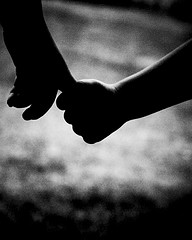For a while now I have been contemplating the question
“is it possible to experience pure joy once the ignorance of childhood has gone?”
I’m thinking of the phrase “ignorance is bliss” when I pose this question. We all lose our ignorance as we get older but there is something about chronic illness that brings a lot of knowledge: knowledge of pain and suffering and icky stuff. Not so conducive to blissful feelings.
I have a draft on this topic and it starts with this:
“when I look at my daughters and their amazing capacity for joy I see a pleasure that comes easily. A pleasure in a new discovery like what happens when you blow up a balloon and let it go. In daring to jump and succeeding, or failing and landing on their butts, giggling. I see and I wonder how they do it.
How do they surrender to the moment completely so that in that moment they are joy?”
I came across this postcard on Facebook the other day (thank you PowerPlug! (Motivational Quotes) ) and I think the answer lies in the first sentence of this quote:
They don’t need a reason. They are just happy, most of the time.
Don’t get me wrong, it’s not all roses. The thorns are there too. The tragedy of denial “don’t eat the snail, take it out of your mouth!!!” is an equally vivid, full blown experience. It is also a wonder and and awesome sight to behold. the rage followed quickly by the sorrow. Then, in a blink of an eye, it is gone. (Yes 3 exclamation marks are necessary; she wasn’t trying to chew it, she was sucking on it. Excuse me while I heave again).
As adults we have had many experiences, good and bad. We tend to tone down the joy and try to mute the sorrow. We have gained knowledge and developed our consciousness. We have learnt how to choose what we want to study at school, where we want to live, what haircut and clothes etc and these are all fine. But are they enough? Do these choices give us a fulfilling life? Do they make us happy? I say no, no they do not.
Instead of the usual choices let’s do something different. Let’s choose how we feel.
Yes I still need to figure out what happens to bliss once you get “knowledge” but today I am choosing to be happy. For no reason.




